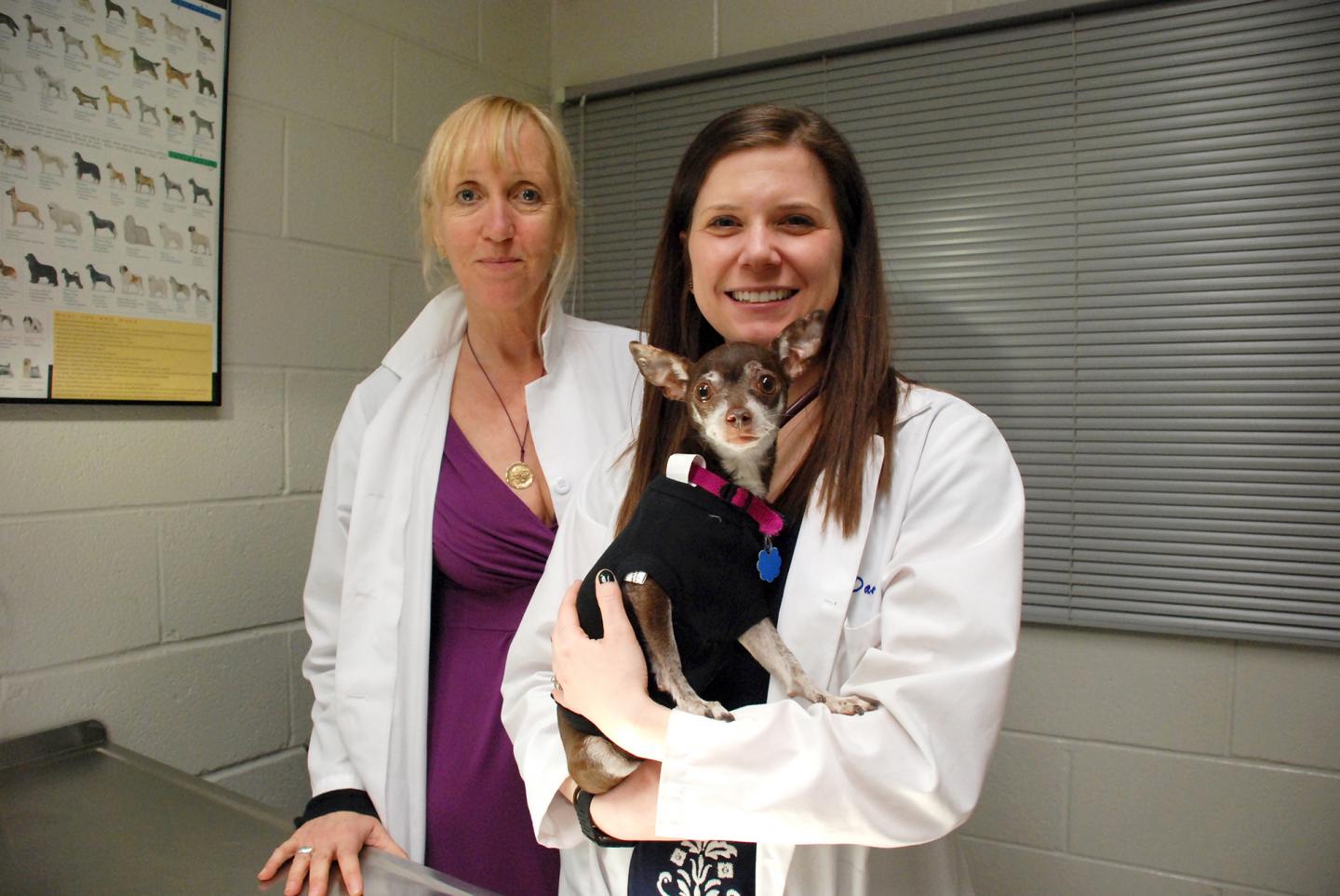A ‘bio-scoring’ system, developed by School of Veterinary Medicine researchers, gives veterinarians and pet owners a clearer way to plan treatment.

Credit: John Donges/School of Veterinary Medicine/University of Pennsylvania
Mammary tumors in dogs are the equivalent of breast cancers in people, and, as in the human disease, the canine tumors can manifest in a variety of ways. Some are diagnosed early, others late, and they can be either slow growing or aggressive.
Yet current prognostic tools, which provide information about the tumor stage–how large or dispersed it is–and grade–how likely it is to grow quickly–don’t always give veterinarians or owners clear picture of how a tumor is going to progress, and what treatments might be most appropriate.
A new “bio-scoring” system, devised by a team led by Karin Sorenmo, a veterinary oncologist at Penn’s School of Veterinary Medicine, equips clinicians with a more reliable prognosticating method. The researchers shared their work in the journal Veterinary and Comparative Oncology.
“Mammary gland carcinomas are the most common tumors in intact dogs around the world,” says Sorenmo. “Yet we still haven’t made great progress in deciding which dogs are fine with just surgical treatment, which dogs might require chemotherapy, and which dogs might benefit from hormonal treatment. In testing this new approach, we found it helps identify the dogs that develop metastasis better than other methods. I’m very excited about it.”
To develop and assess this new scoring method, Sorenmo relied on a unique dataset that emerged from Penn Vet’s Shelter Canine Mammary Tumor Program. This initiative, spearheaded by Sorenmo, enables shelter dogs to receive treatment for their mammary tumors, then finds foster or permanent homes for each animal. Researchers such as Sorenmo and others benefit from studying the dogs, including how they respond to treatment.
The current work took data from 96 dogs treated through the program, as well as an additional 31 dogs treated in a similar fashion at the Norwegian University of Life Sciences. The records they used including the pets’ disease stage, grade, treatments received, and outcome–specifically, the time to metastasis, or spread of their disease within the body.
The “golden rule” for determining treatment currently, Sorenmo says, is to look at tumor stage, from stage I when the tumor is localized and small, up to stage IV when it has spread to distant organs.
“That’s fine for some tumors that tend to behave in a certain way,” Sorenmo notes, “but with mammary tumors it can be such a diverse disease.”
Dogs can have advanced stage disease but, if their tumor has a low grade–that is, it is not fast-growing–they may have a better outcome than a dog with a lower stage but a more advanced grade. In addition, a tumor’s histology, or the molecular markers that characterize the cancer cells, can further influence its behavior and the eventual outcome of treatment.
“We really didn’t have a system to pull all the data together,” Sorenomo says.
Looking to human oncology, Sorenmo and colleagues decided to borrow the idea of a scoring method that has been used to categorize breast cancers. They pulled together three pieces of information to attempt to more accurately determine a dog’s prognosis: stage, grade, and histological type.
Some interesting findings arose from the statistical analysis. “We found that if you had a grade 1 tumor, no matter how large it gets, the vast majority of the time it doesn’t cause any trouble,” she says.
Since a good number of the dogs in the study had experienced long delays in receiving care due to being abandoned or in shelters, and thus had larger tumors than one would expect to see in the pet populations, the researchers were able to detect this size-independent effect.
“It’s the same thing with lymph node involvement,” says Sorenmo. “Everyone thinks that is a sign that the cancer has already started to move, but again we found that with a grade 1 tumor it doesn’t matter. Those dogs didn’t develop distant metastasis.”
Using the overall bio-score, the researchers were able to differentiate dogs at lower risk of developing metastasis from those at a higher risk. If a pet has a higher bio-score, Sorenmo says, then a veterinarian or an owner may want to consider more aggressive treatment options, including chemotherapy. Dogs with a lower bio-score, on the other hand, may do just as well with surgical intervention alone.
In future work, Sorenmo would like to build on these findings by isolating the effect of hormones on mammary tumor and disease progression. Since the standard of care for treating dogs in the program is to spay them, she notes that doing so may remove a source of hormones that could be contributing to the dogs’ disease in many cases.
For now, she is glad to have developed a system that can be implemented easily and immediately into treatment planning decisions.
“I try not to publish on things that most practicing veterinarians are not going to be able to use, like fancy tests that they won’t routinely order,” Sorenmo says. “This is practical. You look at three different things, given them a number and add it up.”
###
Karin Sorenmo is a professor of oncology in the University of Pennsylvania School of Veterinary Medicine.
Sorenmo’s coauthors were Amy C. Durham, Michael C. Goldschmidt, and Darko Stefanovski of Penn Vet; Veronica Kristiansen of the Norwegian University of Life Sciences; and Laura Pena of Complutense University of Madrid.
The study was supported by the Penn Vet Shelter Canine Mammary Tumor Program, the Petco Foundation, and the Blue Buffalo Foundation.
Media Contact
Katherine Unger Baillie
[email protected]
Original Source
https:/
Related Journal Article
http://dx.




